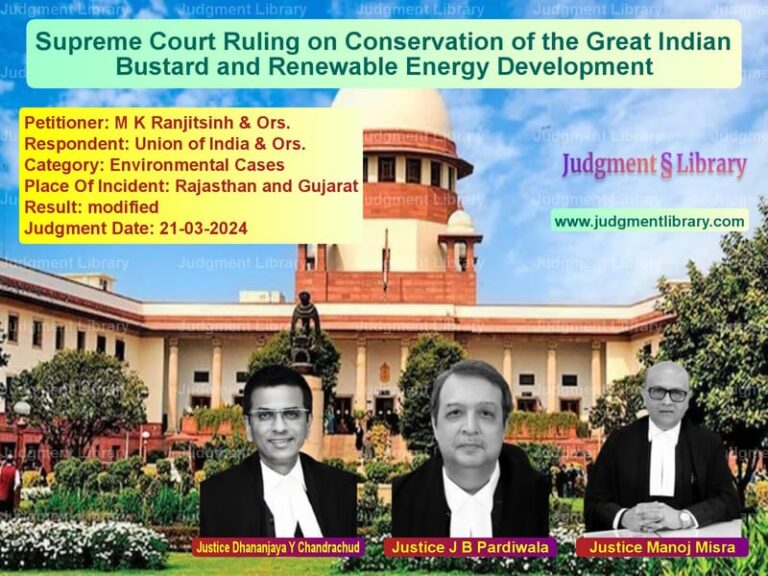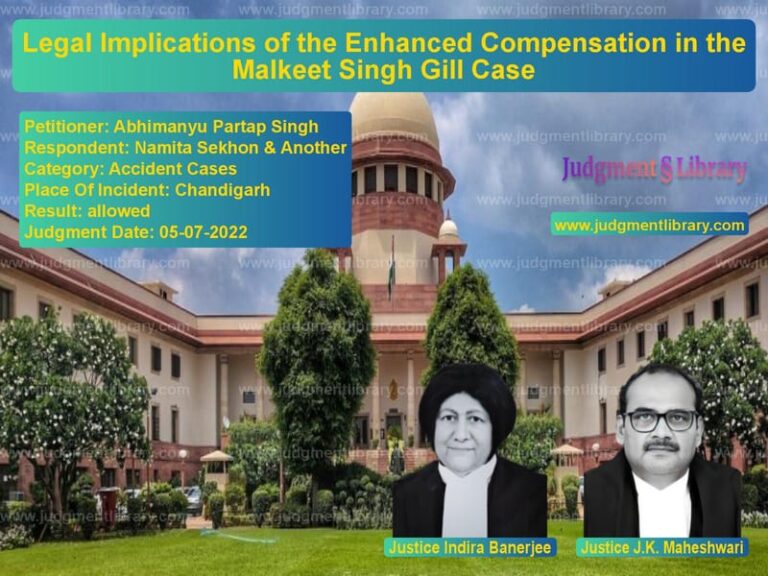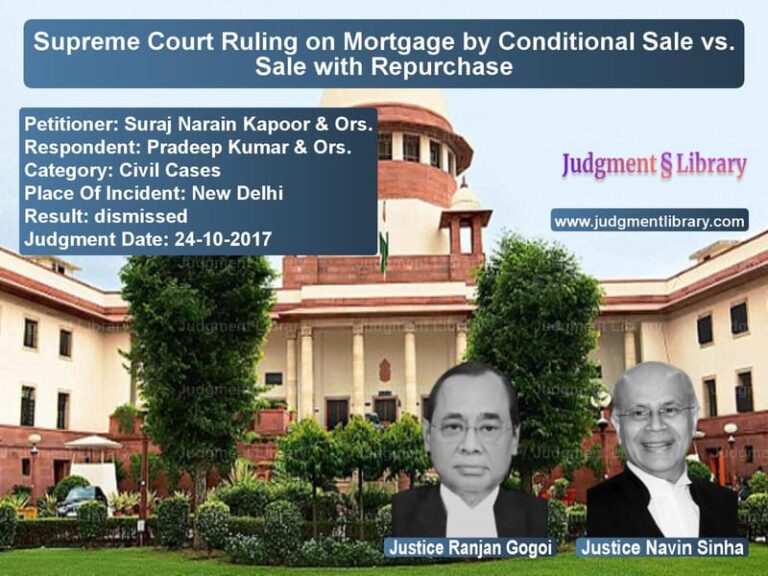Supreme Court Rules on Illegal Demolition: Upholding Rule of Law and Protecting Fundamental Rights
The Supreme Court of India recently delivered a significant judgment in Various Citizens vs. Union of India & Ors., addressing the issue of illegal demolitions conducted by state authorities without following due legal process. This ruling reinforces the fundamental principle of the rule of law and safeguards the rights of individuals, particularly those accused in criminal cases, from arbitrary state action.
Background of the Case
The case arose from multiple writ petitions filed under Article 32 of the Constitution by affected citizens who alleged that their properties were demolished without prior notice or due process. The petitioners claimed that the state governments had been selectively targeting individuals accused of crimes by ordering the demolition of their homes and commercial establishments without proper adjudication.
The petitions sought the following reliefs:
- A directive preventing state authorities from demolishing properties of accused individuals without a legal order.
- Strict action against officials responsible for carrying out arbitrary demolitions.
- Guidelines to ensure the protection of property rights and fundamental rights in such cases.
Key Legal Issues Considered
- Whether state authorities have the power to demolish properties without legal adjudication.
- Whether such demolitions violate Article 14 (Right to Equality) and Article 21 (Right to Life and Personal Liberty) of the Constitution.
- The applicability of the rule of law and separation of powers in preventing executive overreach.
- The need for judicial oversight in cases where demolitions are linked to criminal accusations.
Petitioner’s Arguments
- The petitioners argued that demolitions were being carried out without proper notices, violating the principle of natural justice.
- They contended that individuals accused of crimes are presumed innocent until proven guilty, and demolishing their homes without a fair trial amounted to extrajudicial punishment.
- They cited several precedents where the Supreme Court had ruled that executive actions must be backed by legal authority and due process.
- The petitioners claimed that in many cases, state authorities had justified the demolitions on the grounds of “illegal encroachments,” even when the owners had valid property documents.
Respondent’s Arguments
- The state governments defended the demolitions, stating that they were carried out against unauthorized constructions.
- They contended that due process was followed and notices were served before demolitions.
- They argued that the government has the authority to take action against illegal encroachments under municipal laws.
- The respondents maintained that demolitions were not linked to criminal proceedings but were part of routine urban planning measures.
Supreme Court’s Analysis
1. Rule of Law and Executive Overreach
The Court reiterated that India is a country governed by the rule of law, where state actions must be legally justified. The judgment stated:
“The fundamental principle of governance is that the executive cannot assume judicial powers. A person accused of an offense must be tried before a competent court, and no punitive action, including demolition, can be taken unless it is sanctioned by law.”
The Court observed that punishing an accused by demolishing their property before conviction violates the presumption of innocence.
2. Violation of Fundamental Rights
The Supreme Court emphasized that demolitions without due process violate Article 14 and Article 21 of the Constitution. The judgment held:
“The right to shelter is a fundamental right under Article 21. The state cannot deprive a person of their home without following a fair and reasonable procedure established by law.”
It also noted that selective demolitions targeting individuals based on their religious, social, or political affiliations are unconstitutional.
3. Procedural Fairness and Natural Justice
The Court ruled that procedural fairness is essential in all executive actions, particularly demolitions. It cited previous judgments, such as Olga Tellis vs. Bombay Municipal Corporation (1985), where the right to housing was recognized as part of the right to life.
The judgment further held:
“No person shall be deprived of their property without an opportunity to be heard. Demolitions without proper notice violate the principles of natural justice.”
4. Judicial Oversight and Accountability
The Court directed that no demolition shall be carried out without:
- Prior issuance of a show cause notice providing at least 15 days for the affected party to respond.
- A personal hearing before an independent authority.
- Providing the individual an opportunity to challenge the demolition order before a judicial body.
- Ensuring that officers executing illegal demolitions are held personally accountable.
The judgment also ordered compensation for individuals whose properties were unlawfully demolished.
Final Judgment
- The Supreme Court ruled in favor of the petitioners and directed state governments to stop arbitrary demolitions.
- The Court declared that all future demolitions must comply with due process requirements.
- Compensation was ordered for affected individuals, and officials responsible for illegal demolitions were to be held accountable.
Implications of the Judgment
- Strengthening Rule of Law: The judgment reaffirms that executive actions must be legally justified and cannot override constitutional rights.
- Protecting Property Rights: The ruling ensures that demolitions must follow due process and cannot be used as a punitive measure.
- Judicial Oversight: The Court’s directions mandate judicial scrutiny before demolitions, reducing the possibility of misuse of power.
- Accountability of State Officials: Holding government officials responsible for illegal actions strengthens governance and prevents future violations.
- Compensation for Victims: The ruling sets a precedent for awarding damages to those affected by unlawful demolitions.
Conclusion
The Supreme Court’s ruling is a landmark decision that upholds constitutional principles and protects citizens from arbitrary state actions. By ensuring procedural fairness, the judgment prevents misuse of demolition powers and reinforces the importance of legal safeguards in administrative actions.
Petitioner Name: Various Citizens.Respondent Name: Union of India and State Governments.Judgment By: Justice B.R. Gavai, Justice K.V. Viswanathan.Place Of Incident: Various locations across India.Judgment Date: 13-11-2024.
Don’t miss out on the full details! Download the complete judgment in PDF format below and gain valuable insights instantly!
Download Judgment: various-citizens-vs-union-of-india-and-s-supreme-court-of-india-judgment-dated-13-11-2024.pdf
Directly Download Judgment: Directly download this Judgment
See all petitions in Fundamental Rights
See all petitions in Public Interest Litigation
See all petitions in Separation of Powers
See all petitions in Constitution Interpretation
See all petitions in Judgment by B R Gavai
See all petitions in Judgment by K.V. Viswanathan
See all petitions in allowed
See all petitions in Declared Infructuous
See all petitions in supreme court of India judgments November 2024
See all petitions in 2024 judgments
See all posts in Constitutional Cases Category
See all allowed petitions in Constitutional Cases Category
See all Dismissed petitions in Constitutional Cases Category
See all partially allowed petitions in Constitutional Cases Category







